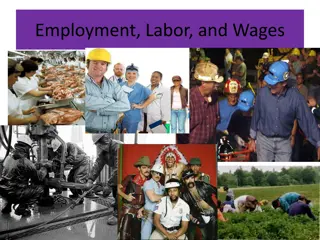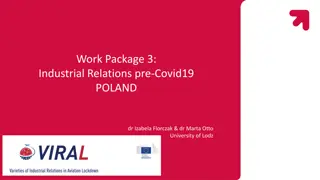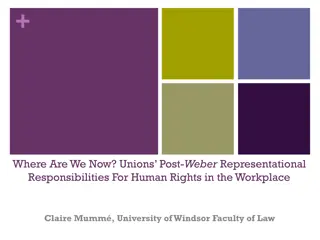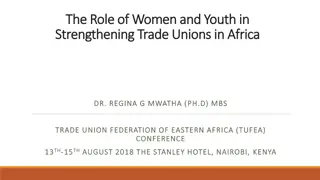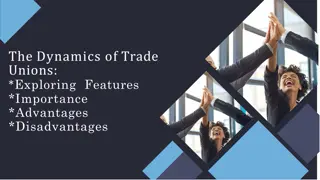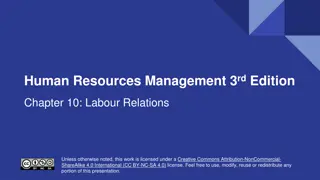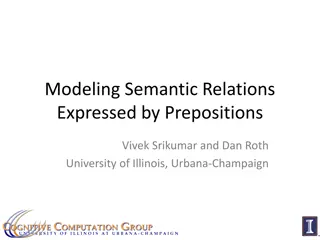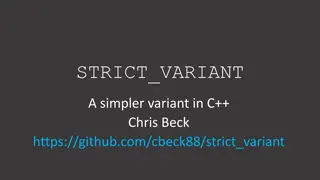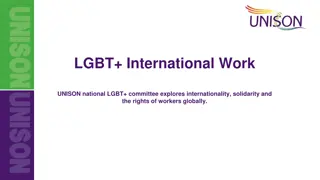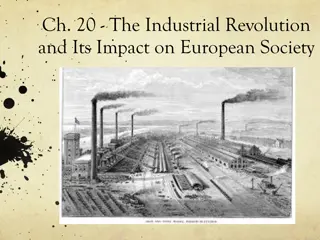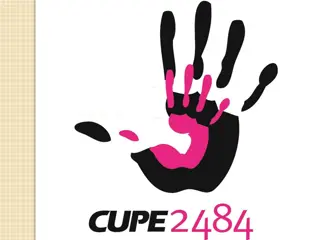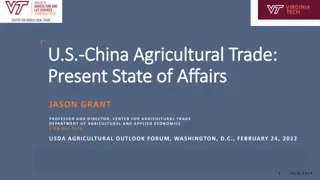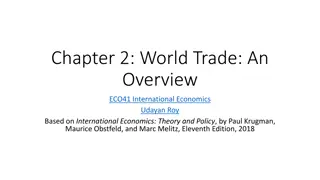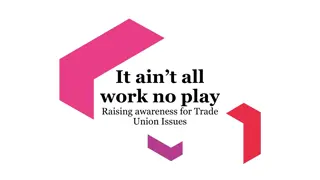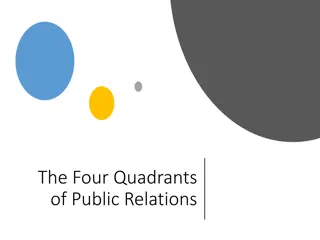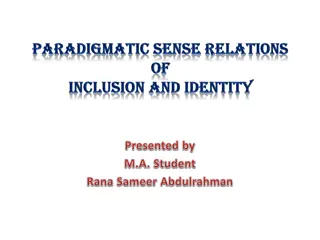Understanding Industrial Relations and Trade Unions
Industrial relations refer to the management-employee relationships within a firm, and trade unions represent employees' interests in negotiations with employers. This article discusses the roles of trade unions, causes of industrial disputes, actions in industrial conflicts, types of disputes, decision-making in disputes, and resolving conflicts in the workplace.
Download Presentation

Please find below an Image/Link to download the presentation.
The content on the website is provided AS IS for your information and personal use only. It may not be sold, licensed, or shared on other websites without obtaining consent from the author. Download presentation by click this link. If you encounter any issues during the download, it is possible that the publisher has removed the file from their server.
E N D
Presentation Transcript
Forbairt Foghlaim www.pdst.ie F s
Industrial Relations This is the term used to describe the relations between the management of a firm and its employers. www.pdst.ie p d s t 2 0 1 4
What is a trade union? Is a body representing employee s views with their employers? Union members elect a shop steward to represent them in negotiations with the employers. Reasons for joining a trade union 1. Increased bargaining power one voice as a representative 2. Having a skilled negotiator on behalf of employees 3. Greater job security if the union is powerful 4. Higher standard of living for members www.pdst.ie p d s t 2 0 1 5 / 2 0 1 6
Causes of Industrial Disputes Pay disputes Working conditions Unfair dismissals Promotion Poor industrial relations Introduction of new technology Discrimination www.pdst.ie p d s t 2 0 1 5 / 2 0 1 6
Action which the employee/employer can take in an industrial conflict Getting Legal Approval Before organising a strike or any other form of industrial action a trade union must follow the rules set out in the Industrial Relations Act 1990. This states that a union cannot organise a strike or any other industrial action without getting members majority approval www.pdst.ie p d s t 2 0 1 5 / 2 0 1 6
Official disputes are ones which have received the approval of workers in a secret ballot and are confirmed by the ICTU. The union must then decide the type, the timing of the industrial action. Unofficial disputes have no ICTU or union approval. A wildcat or lightning strike is an unofficial dispute where no advance notice is given to management www.pdst.ie p d s t 2 0 1 5 / 2 0 1 6
Deciding on the action to take Token stoppages Work to rule A go slow occurs All out strike Picketing www.pdst.ie p d s t 2 0 1 5 / 2 0 1 6
How an industrial relations conflict between employees/employers can be resolved Internal Solutions 1. 2. Take the complaint to the union shop steward The union shop steward will follow the grievance procedure agreed with the employer If no union, agreed employees should talk directly to manager responsible or to the HR manager 3. www.pdst.ie p d s t 2 0 1 4
Help from the WRC 4. Agreement of both sides, the matter is taken to the LRC which provides the following conflict resolution services. Conciliation services Rights Officer Service www.pdst.ie p d s t 2 0 1 4
Getting Help From the LABOUR COURT 5. This is seen as the last resort for industrial disputes. It provides an ARBITRATION SERVICE for group conflict resolution. www.pdst.ie p d s t 2 0 1 5 / 2 0 1 6
Industrial Relations Act There have been a number of changes in relation to Employment Law in Ireland. www.pdst.ie p d s t 2 0 1 5 / 2 0 1 6
Amendments The Industrial Relations (Amendment) Act 2012: This Act reforms the way that wage are set using Employment Regulation Orders and Registered Employment Agreements. www.pdst.ie p d s t 2 0 1 5 / 2 0 1 6
The Industrial Relations Act 2015 has been amended, it provides for a system of registered employment agreements and sectoral employment orders. www.pdst.ie p d s t 2 0 1 5 / 2 0 1 6
Workplace Relations Act 2015 Workplace Relations Act 2015 reorganises and reforms employment rights structures by establishing the Workplace Relations Commission. www.pdst.ie p d s t 2 0 1 5 / 2 0 1 6
Workplace Relations Act 2015 Replaces . The Labour Relations Commission Rights Commissioner Service Equality Tribunal National Employment Rights Authority. www.pdst.ie p d s t 2 0 1 5 / 2 0 1 6
Employment Equality Act 2004 Equality Act 2004: This legislation makes significant amendments to the Employment Equality Act 1998 which prohibits discrimination in a range of employment-related areas. www.pdst.ie p d s t 2 0 1 5 / 2 0 1 6
Prohibited Grounds of Discrimination Gender Marital status Family status Age Race Religious belief Disability Sexual orientation Membership of the Traveller community. www.pdst.ie p d s t 2 0 1 5 / 2 0 1 6
The Act also prohibits sexual and other harassment. The Equality Act also amends the Equal Status Act 2000 to extend the definition of sexual harassment and shift the burden of proof from the complainant to the respondent. www.pdst.ie p d s t 2 0 1 5 / 2 0 1 6
Unfair Dismissals Act 1993 Unfair Dismissals Act 1993 updates unfair dismissals law and amends previous legislation dating from 1977. www.pdst.ie p d s t 2 0 1 5 / 2 0 1 6
Fs FoghlaimForbairt www.pdst.ie The PDST is funded by the Teacher Education Section (TES) of the Department of Education and Skills (DES) and is managed by Dublin West Education Centre


